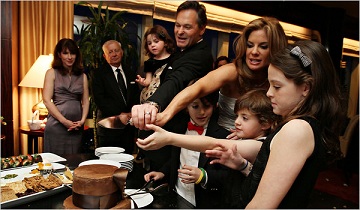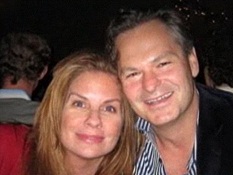December 22, 2010
Infidelity And Other Taboos, Media Style

Freud was a punk

The story that is making the internet and morning TV rounds:
Two people, a man who looks suspiciously like Julian Assange, and a TV reporter who looks exactly like every MILF porn actress working today, divorce their spouses and get married.
The original couples were friends, and the two met at their kids' elementary school. There are five kids between them, and, you know, whatever.
The twist is that they announced their marriage in the Style section of the New York Times, because, of course, they hooked up in style. The further twist is that they semi-shamelessly recount in the Times how they fell in love while they were still married to other people.
Carol Anne Riddell and John Partilla met in 2006 in a pre-kindergarten classroom. They both had children attending the same Upper West Side school. They also both had spouses. ... The connection was immediate, but platonic. In fact, as they became friends so did their spouses. There were dinners, Christmas parties and even family vacations together.
Hardly uncommon; hardly newsworthy, but a little-- brazen?-- to reveal you were basically cheating. Why even mention all that about the school and the spouses? Why not simply say "we met and fell in love?" Or better yet, why not just say nothing? And why would the NYT report this?
The story inspired the predictable controversy with the obvious positions:
"The NYT's responsibility is to report, not be the judge."
"There's no infidelity-- they didn't have an affair, they split with their spouses before getting together."
"Cheat if you must, but don't try to parade it in public as a love affair..."
Whether what they did is wrong or modern is easy to answer (yes x 2) and not the point here. Nor is the point-- a good one nonetheless-- that by the running of the story, the New York Times reinforces its position as the one who decides things, in this case ethical things. You may be invited to offer comment, of course, but the best you can do is agree or disagree with the NYT-- they become the authority. The burden of proof falls to you to explain why they're wrong.
Nor is the point that these two dummies didn't anticipate that they'd be criticized. Were they really so brazen, so shameless, to think we'd all be "wow, that's so Lifetime Original Special!" Not exactly.
The mistake is in thinking they shouldn't have publicized their story. They didn't have any other choice.
It's a mantra: narcissists don't feel guilt, only shame. Well, it's not completely true, sometimes they do feel guilt, but you have to be hitting on a taboo to feel it.
Even the most hardened narcissist feels some passing guilt when their spouse is sobbing on the kitchen floor. How do you get over that? (Pills won't help, but psychiatry is happy to tell you they might.)
This is how narcissism eradicates guilt: it rewrites the story, or as the po-mo mofos say, "offer a competing narrative."
[Offers Ms. Riddell] We did this because we just wanted one honest account of how this happened for our sakes and for our kids' sakes.
One honest account? Which were the accounts that were not honest? Were there any other accounts at all? Oh, yeah, reality. Well that account doesn't count. This one's better:
it all changed two years later when Partilla invited her out for a drink at a local watering hole, the first time they had gotten together away from their spouses. "I've fallen in love with you," Riddell recalled Partilla as saying. She said she beat a path out of the bar, only to return five minutes later to tell him, "I feel the exact same way."
Dress it up in the language of a story, of overcoming, of finding a soul mate, of mid-life romance, of self-actualization. These two were fortunate enough to be able to make it an actual story-- in which they are the main characters and everyone else is supporting cast and the readers-- you-- will focus on the main characters. You may hate them, but that doesn't matter. What matters is that they are the main characters. That turns guilt into shame, and if there's no shame
We are really proud of our family and proud of the way we handled the situation. There was nothing in the story to be ashamed of.
They win. That's how narcissism discharges guilt.
You'll notice that the exes are not mentioned by name or interviewed in the story; that's not to protect their identity, it's because the author of the article didn't care/need to interview them, because the author, and the new couple, are focused on the STORY. Win.
In other words, putting their otherwise quite shameful story in the NYT wasn't dumb, poor judgment, or even damaging to their reputations no matter how many people end up hating them. It was necessary to their own emotional survival. As long as you hate them for it, they don't have to hate themselves.
II.
I do not like the hypocrisy game, where you try to detect hypocrisy in someone as a proxy for dismissing their ideas; it is lazy and unhelpful, and usually done by those who themselves overvalue projected identity. But sometimes you can't help but play. Which brings me to this nut:
First, let's get the preliminaries cleared out of the way. A week ago, Sarah Palin was never going to be president of the United States. Today, Sarah Palin is never going to be president of the United States. Once you've accepted that fact (although it's not clear that Palin herself has), the political impact of this decision is minimal -- the Republicans as a party look even a little flakier than before (bad for the GOP, but what else is new?)
I don't expect journalists or anyone else to be free of moral ambiguity, but it should be a postulate that if you choose to write those words you should not also be having sex with your daughter. Allegedly.
David Epstein, HuffPo-Mo blogger and Columbia professor of Applied Po-Mo allegedly had a sexual relationship with his 24 year old daughter. I'll save you the google search: he doesn't have a mustache. I was surprised as well.
Many think his behavior is shameful. Harsh. Some think it is illegal, though clever people found Lawrence v. Texas on wikipedia and discovered "an emerging awareness that liberty gives substantial protection to adult persons in deciding how to conduct their private lives in matters pertaining to sex." After a nap they figured that might apply to incest as well. And why not? Consenting adults? It's a privacy issue, right?
Oh, it's a privacy issue, but not in the way Scalia meant. The goal isn't privacy, the goal is the reverse.
Dummy and his daughter allegedly sent text messages to each other, which anyone with a Nike shirt knows is what you want to do to get caught as quickly as possible. I'm not saying Epstein wanted to get caught (though I am thinking it), but when you break a taboo you either face the guilt Dostoyevsky style with a lonely nervous breakdown and a trip to redemptive Siberia or you get out a pen and rewrite the story. In Epstein's case, we're rewriting it for him: the mere discussion of this nonsense, the simple fact that any of us hate our fathers enough to write, "yes, but it's a legal issue..." means that Id and Ego fought Superego and Id and Ego won. He's taken private guilt and core dumped it to the internet for public judgment and the internet will always be more forgiving than he could ever be. As cocaine magnate Sigmund Freud wrote, "when the story goes live the guilt goes dead."
III.
The stats on second marriages and the psychology of vampires and vagina predict that Riddell and Partilla will stay married. When you hook up in the presence of adversity it tends to reinforce the relationship as they steel themselves against Those Who Just Don't Understand (though watch out, sometimes you find that that adversity was the only thing keeping you together). And it's not how I'd run my life, but they did it and there's no use yelling at them, they have to make it work for themselves and for the kids, so best of luck: bad start, hope you make it worth it.
But what you need to get out of these stories is how this generation and forwards will deal with guilt: externalizing it, converting it to shame, and then taking solace in the pockets of support that inevitably arise. Everyone is famous to 15 people, and that's just enough people to help you sleep at night.
It is, in effect, crowdsourcing the superego, and when that expression catches on remember where you first heard it. Then remember why you heard it. And then don't do it.
---
You might also enjoy:
How to get away with rape
Charlie Sheen Has An Awesome Experience
The Atlantic Recommends Abandoning Marriage
Don't Settle For The Man You Want
---
http://twitter.com/thelastpsych
85 Comments